- Home
- Neil Gaiman
Darker Terrors Page 14
Darker Terrors Read online
Page 14
His supplies were ready on the nightstand. Justin plugged the drill’s power cord into the socket behind the bed, gently thumbed up one of Suko’s makeup-smudged eyelids and examined the silvery sclera. The sleeping pills had worked fine, as always. He ground them up and put them in a glass before he left. That way, when he brought home company, Justin could simply pour him a drink in the special glass.
He used the scissors to slice off Suko’s shirt, which was so artfully ripped up that Justin hardly had to damage it further to remove it. He cut away the beads and amulets, saving the tiny wooden penis, which had caught his eye back at the Stag. His own penis ached and burned. He pressed his ear against the narrow chest, heard the lungs pull in a deep slow breath, then release it just as easily. He heard blood moving unhurried through arteries and veins, heard a secret stomach sound from down below. Justin could listen to a boy’s chest and stomach all night, but reluctantly he took his ear away.
He crawled onto the bed, positioned Suko’s head in his lap, and hefted the drill, which was heavier than he remembered. He hoped he would be able to control how far the bit went in. A fraction of an inch too deep into the brain could ruin everything. It was only the frontal lobes he wanted to penetrate, the cradle of free will.
Justin parted the boy’s thick black hair and placed the diamond-tipped bit against the centre of the pale, faintly shiny scalp. He took a deep breath, bit his lip, and squeezed the trigger. When he took the drill away, there was a tiny, perfect black hole near the crown of the boy’s head.
He picked up the syringe, slid the needle in and forward, toward the forehead. He felt a tiny resistance, as if the needle was passing through a hair-thin elastic membrane. He pushed the plunger and flooded the boy’s brain with chlorine bleach.
Three things happened at once.
Suko’s eyes fluttered open.
Justin had an explosive orgasm in his pants.
Something heavy thudded against the bathroom door.
Suko saw the blond man’s face upside down, the lilac eyes like little slices of moon, the mouth a reverse smile or grimace. A whining buzz filled his skull, seemed to jar the very plates of his skull, as if hornets had built a nest inside his brain. A dull ache spread spider-like over the top of his head.
He smelled roses, though he had seen none in the room. He smelled wood shavings, the sharp stink of shit, the perfume of ripe oranges. Each of these scents was gone as quickly as it had come. Lingering was a burnt metallic flavour, a little like the taste that had lingered in his mouth the time he’d had a tooth filled in Bangkok.
Shavings. Roses. Cut grass. Sour milk. And underneath it all, the smell of rotting flesh.
Suko’s field of vision went solid screaming chartreuse, then danger red. Now Justin was back, a negative of himself, hair green, face inky purple, eyes white circles with pinholes at their centres like tiny imploding suns. And suddenly something else was in the frame as well. Something all black, with holes where no holes should be. A face swollen and torn, a face that could not be alive, but whose jaw was moving.
A hand missing most of its fingers closed on the back of Justin’s hair and yanked. A drooling purple mouth closed on Justin’s throat and tore away a chunk.
Suko managed to sit up. His vision spun and yawed. The reek of rot was dizzying, and overlying it was a new stinging smell, a chemical smell he could not identify. Something salty ran into his eyes. He touched his face, and his fingers came away slicked with a thin clear substance.
The thing wrapped skeletal arms around Justin and pulled him off the bed. They rolled on the floor together, Justin’s blood fountaining out of his throat, the thing grunting and lapping at it.
Ragged flesh trailed from its mouth.
Justin wasn’t screaming, Suko realised.
He was smiling.
It was the boy from the bathtub. Justin couldn’t see his face, but he could smell the Clorox, raw and fresh. He had carved a great deal of flesh off of this one, as well as removing the viscera. But he had not yet cut off the head. Now it was snuggled under his chin, tongue burrowing like a worm into his wounded throat. He felt the teeth tearing at him, chunks of his skin and muscle disappearing down the boy’s gullet. He felt one of the bones in his neck crack and splinter.
The pain was as shocking as an orgasm, but cleaner. The joy was like nothing he had known before, not when he watched his mother die, not when he tasted the flesh of another person for the first time. It had worked. Not only was the Asian boy still alive, but the others had come back as well. They had never left Justin at all. They had only been waiting.
He got his arms around the hollow body, pulled it closer. He cupped the cold rubbery buttocks, entwined his legs with the thrusting bones of its thighs. When its jaws released his throat, he pressed his face against the voracious swollen one, pushed his tongue between the blackened lips and felt the teeth rip it out. His mouth filled with blood and rot. He swallowed, gagged, swallowed again.
A head rolled out from under the bed, pushing itself by frantic motions of jaw and tongue. The severed ends of the neck muscles twitched, trying to help it along. Its nose and left eyebrow were pierced with silver rings, its empty eye-sockets crusted with blood and greasy black makeup. It reached Justin and bit deep into one of his thighs. He kicked once, in surprise, then bent his leg so that the teeth could more easily get at the soft muscle of his groin. He felt his flesh peeling away.
The upper half of a body was pulling itself out of the closet. Its black-lacquered nails dug into the carpet. Ropes of intestine trailed behind it, coming apart, leaving a trail of shit and ichor on the rug. This one had been, possibly, a Mexican boy. Now its skin was the colour of decaying eggplant, and very few teeth were left in its gaping mouth. Dimly Justin remembered extracting them with a pair of pliers after the rigor mortis had slackened.
It tore Justin’s belly open with its hands and sank its face into his guts. He arched his back, felt its fingers plunging deep, its mouth lapping at the very core of him.
The small pleasures of his life – reading, listening to the music of another time, choking the life out of boys and playing with their abandoned shells – were nothing compared to this. He wanted it to go on forever.
But, eventually, he died.
The corpse from the bathtub chewed at Justin’s throat and chest. Half-chewed pieces of Justin slid down its gullet, into the great scooped-out hollow of its abdomen, out onto the floor. The corpse from the closet sucked up the liquor and partly digested meat it found in Justin’s stomach. The head bit into Justin’s scrotum and gulped the savory mass of the testicles like a pair of tender oysters.
They seemed to know when to stop feeding, to refrain from pulling him completely apart, to leave enough of him. When he came back, Justin knew exactly what to do.
After all, he had been doing it long before most of the others.
Suko stumbled out of the bedroom and slammed the door behind him. Something was rolling around and around in the refrigerator, banging against the inside of the door. He almost went over to open it, only caught himself at the last second. He wasn’t thinking very clearly. His head felt wrong somehow, his brain caught in a downward spiral. He did not understand what he had just seen. But he knew he had to get out of the apartment.
No problem, a voice yammered in his head. Stay cool. Chill out. Don’t have a cow, man. He barely knew the meaning of the words. The American voice seemed to be receding down a long black tunnel; already it was so tiny and faint he could hardly hear it. He realised he was thinking in Thai for the first time in years. Even his native language was strange, a flurry of quick sharp syllables like little whirling razorblades slicing into the meat of his brain.
He fumbled with the complicated series of locks, yanked the door open and nearly fell into the hall. How had he entered the building …? Up a metal staircase, through a door at the end of the long dark hall. He reached it and let himself out. The hot October night seared his lungs. He could smell every poisono
us particle of exhaust blanketing the city, every atom of shit and filth and blood baked onto the streets. Not like the ripe wet kiss of Bangkok, but so arid, so mercilessly dry. He felt his way down the fire escape and around the corner of the building.
The empty street seemed a mile wide. There was no sidewalk, only a steep curb and a long grey boulevard stretching away toward some other part of the city. There were no cars; he could hear no traffic anywhere. Even with his head feeling so strange, Suko knew something was wrong. L.A. streets were often empty of people, but always there were cars.
Far away at the next intersection, he made out a small group of figures straggling in his direction, bathed in a traffic light’s red glow. For a long moment he watched them come, trying to be sure they were really there, wondering what he should do. Then he started toward them. The blond man had done something awful to his head; he needed help. Maybe the figures would be able to help him.
But when he got closer, he saw that they were like the things he had seen in the bedroom. One had a long fatty slash wound across its bare torso. One had been gouged in the face with something jagged; its nose was cloven in half and an eyeball hung out of the socket, leaking yolky fluid. One had no wounds, but looked as if it had starved to death; its nude body was all bone-ends and wasted hollows, its genitals shrivelled into the pelvic cavity, its blue-white skin covered with huge black and purple lesions.
When they saw him, the things opened their mouths and widened their nostrils, catching his scent. It was too late to get away. He couldn’t run, didn’t think he would even be able to stand up much longer. He stumbled forward and gave himself to them.
The little group closed around Suko, keeping him on his feet, supporting him as best they could. Gouged Eyeball caught him and steadied him. Slash Wound mouthed his shoulder as if in comfort, but did not bite. Lesions nudged him, urged him on. Suko realised they were herding him. They recognised him as one of their own, separated from the flock somehow. They were welcoming him back in.
Miserably, Suko wondered what would happen when they met someone alive.
Then the hunger flared in his belly, and he knew.
Poppy Z. Brite is the author of eight novels, several short story collections and some non-fiction. Now known as Billy Martin, he lives in New Orleans with his partner, the visual artist Grey Cross. ‘The greatest horror of “Self-Made Man”,’ reveals the author, ‘is that it was originally written for Book of the Dead 3, an anthology that went through a series of delays, scandals, intrigues and near-lawsuits before sinking under the weight of editorial and publishing idiocy. As for the story itself, it was written when I was mid-way through my novel Exquisite Corpse, and I just had to get some of the Jeffrey Dahmer-mania out of my system before I could go on. Readers have said my characters in the novel are too influenced by Dahmer – wait ’til they get a load of this baby.’
The Wedding Present
NEIL GAIMAN
AFTER ALL THE joys and the headaches of the wedding, after the madness and the magic of it all (not to mention the embarrassment of Belinda’s father’s after-dinner speech, complete with family slide-show), after the honeymoon was literally (although not yet metaphorically) over and before their new suntans had a chance to fade in the English autumn, Belinda and Gordon got down to the business of unwrapping the wedding presents and writing their thank-you letters – thank-yous enough for every towel and every toaster, for the juicer and the bread-maker, for the cutlery and the crockery and the Teasmaid and the curtains.
‘Right,’ said Gordon. ‘That’s the large objects thank-you’d. What’ve we got left?’
‘Things in envelopes,’ said Belinda. ‘Cheques, I hope.’
There were several cheques, a number of gift tokens, and even a £10 book token from Gordon’s Aunt Marie, who was poor as a church mouse, Gordon told Belinda, but a dear, and who had sent him a book token every birthday for as long as he could remember. And then, at the very bottom of the pile, there was a large, brown businesslike envelope.
‘What is it?’ asked Belinda.
Gordon opened the flap and pulled out a sheet of paper the colour of two-day-old cream, ragged at top and bottom, with typing on one side. The words had been typed with a manual typewriter, something Gordon had not seen in some years. He read the page slowly.
‘What is it?’ asked Belinda. ‘Who’s it from?’
‘I don’t know,’ said Gordon. ‘Someone who still owns a typewriter. It’s not signed.’
‘Is it a letter?’
‘Not exactly,’ he said, and he scratched the side of his nose and read it again.
‘Well,’ she said, in an exasperated voice (but she was not really exasperated; she was happy. She would wake in the morning and check to see if she was still as happy as she had been when she went to sleep the night before, or when Gordon had woken her in the night by brushing up against her, or when she had woken him. And she was). ‘Well, what is it?’
‘It appears to be a description of our wedding,’ he said. ‘It’s very nicely written. Here,’ and he passed it to her.
It was a crisp day in early October when Gordon Robert Johnson and Belinda Karen Abingdon swore that they would love each other, would support and honour each other as long as they both should live. The bride was radiant and lovely, the groom was nervous, but obviously proud and just as obviously pleased.
That was how it began. It went on to describe the service and the reception clearly, simply and amusingly.
‘How sweet,’ she said. ‘What does it say on the envelope?’
‘Gordon and Belinda’s Wedding,’ he read.
‘No name? Nothing to indicate who sent it?’
‘Uh-uh.’
‘Well, it’s very sweet, and it’s very thoughtful,’ she said. ‘Whoever it’s from.’
She looked inside the envelope to see if there was something else in there that they had overlooked, a note from whichever one of her friends (or his, or theirs) had written it, but there wasn’t. So, vaguely relieved that there was one less thank-you note to write, she placed the cream sheet of paper back in its envelope, which she placed in the box-file along with a copy of the Wedding Banquet menu, and the invitations, and the contact sheets for the wedding photographs, and one white rose from the bridal bouquet.
Gordon was an architect, and Belinda was a vet. For each of them what they did was a vocation, not a job. They were in their early twenties. Neither of them had been married before, nor even seriously involved with anyone else. They met when Gordon brought his thirteen-year-old golden retriever, Goldie, grey-muzzled and half-paralysed, to Belinda’s surgery to be put down. He had had the dog since he was a boy, and insisted on being with her at the end. Belinda held his hand as he cried, and then, suddenly and unprofessionally, she hugged him, tightly, as if she could squeeze away the pain and the loss and the grief. One of them asked the other if they could meet that evening in the local pub for a drink, and afterwards neither of them was sure which of them had proposed it.
The most important thing to know about the first two years of their marriage was this: they were pretty happy. From time to time they would squabble, and every once in a while they would have a blazing row about nothing very much that would end in tearful reconciliations, and they would make love and kiss away the other’s tears, and whisper heartfelt apologies into each other’s ears. At the end of the second year, six months after she came off the pill, Belinda found herself pregnant.
Gordon bought her a bracelet studded with tiny rubies, and he turned the spare bedroom into a nursery, hanging the wallpaper himself. The design was covered with nursery rhyme characters, with Little Bo Peep, and Humpty Dumpty, and the Dish Running Away With the Spoon, over and over and over again.
Belinda came home from the hospital with little Melanie in her carrycot, and Belinda’s mother came to stay with them for a week, sleeping on the sofa in the lounge.
It was on the third day that Belinda pulled out the box-file, to show her wedding s
ouvenirs to her mother, and to reminisce. Already their wedding seemed like such a long time ago. They smiled at the dried, brown thing that had once been a white rose, and clucked over the menu and the invitation. At the bottom of the box was a large brown envelope.
‘Gordon and Belinda’s Marriage,’ read Belinda’s mother.
‘It’s a description of our wedding,’ said Belinda. ‘It’s very sweet. It even has a bit in it about Daddy’s slide-show.’
Belinda opened the envelope and pulled out the sheet of cream paper. She read what was typed upon the paper, and made a face. Then she put it away, without saying anything.
‘Can’t I see it, dear?’ asked her mother.
‘I think it’s Gordon playing a joke,’ said Belinda. ‘Not in good taste, either.’
Belinda was sitting up in bed that night, breast-feeding Melanie, when she said to Gordon, who was staring at his wife and new daughter with a foolish smile Upon his face, ‘Darling, why did you write those things?’
‘What things?’
‘In the letter. That wedding thing. You know.’
‘I don’t know.’
‘It wasn’t funny.’
He sighed. ‘What are you talking about?’
Belinda pointed to the box-file, which she had brought upstairs and placed upon her dressing-table. Gordon opened it and took out the envelope. ‘Did it always say that on the envelope?’ he asked. ‘I thought it said something about our wedding.’ Then he took out and read the single sheet of ragged-edged paper, and his forehead creased. ‘I didn’t write this.’ He turned the paper over, staring at the blank side as if expecting to see something else written there.
‘You didn’t write it?’ she asked. ‘Really you didn’t?’ Gordon shook his head. Belinda wiped a dribble of milk from the baby’s chin. ‘I believe you,’ she said. ‘I thought you wrote it, but you didn’t.’

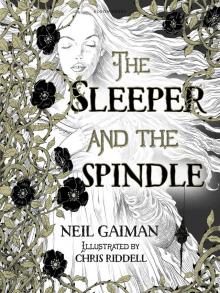 The Sleeper and the Spindle
The Sleeper and the Spindle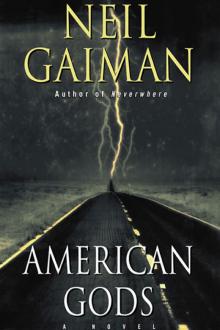 American Gods
American Gods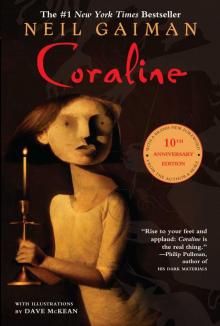 Coraline
Coraline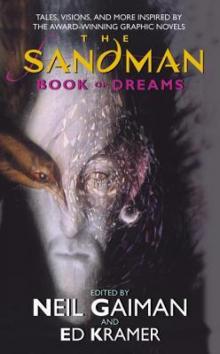 The Sandman: Book of Dreams
The Sandman: Book of Dreams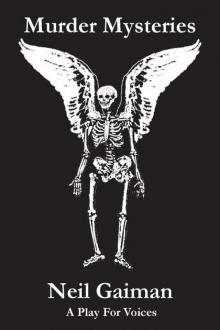 Murder Mysteries
Murder Mysteries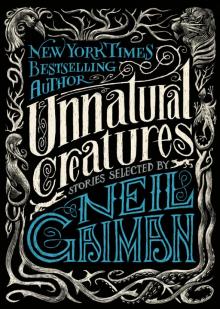 Unnatural Creatures
Unnatural Creatures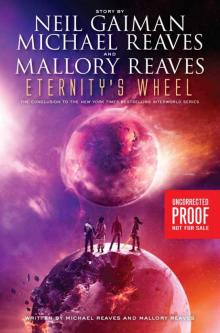 Eternity's Wheel
Eternity's Wheel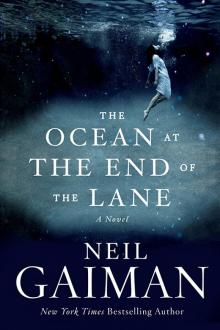 The Ocean at the End of the Lane
The Ocean at the End of the Lane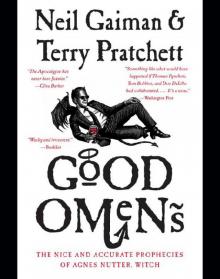 Good Omens
Good Omens Stardust
Stardust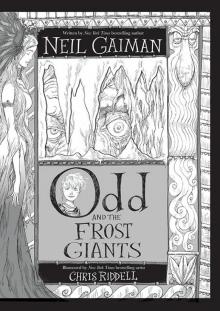 Odd and the Frost Giants
Odd and the Frost Giants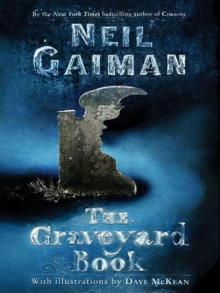 The Graveyard Book
The Graveyard Book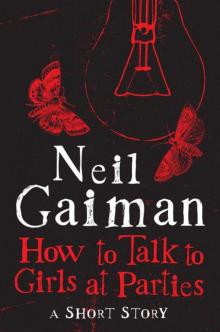 How to Talk to Girls at Parties
How to Talk to Girls at Parties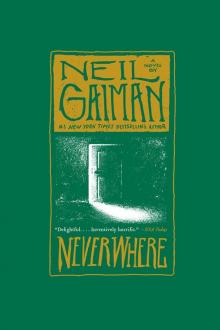 Neverwhere
Neverwhere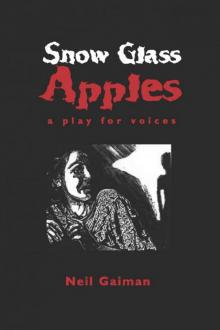 Snow, Glass, Apples
Snow, Glass, Apples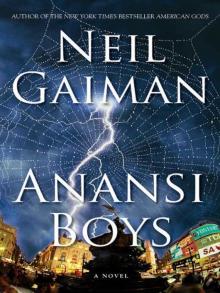 Anansi Boys
Anansi Boys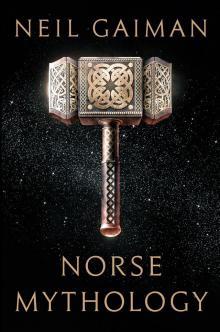 Norse Mythology
Norse Mythology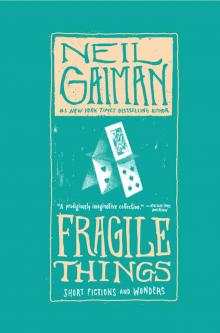 Fragile Things: Short Fictions and Wonders
Fragile Things: Short Fictions and Wonders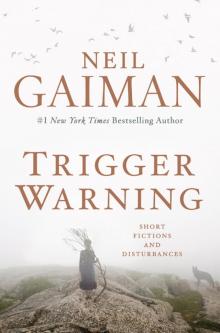 Trigger Warning: Short Fictions and Disturbances
Trigger Warning: Short Fictions and Disturbances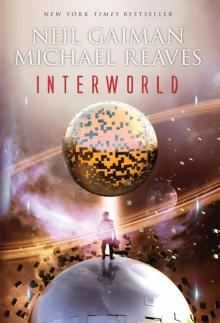 InterWorld
InterWorld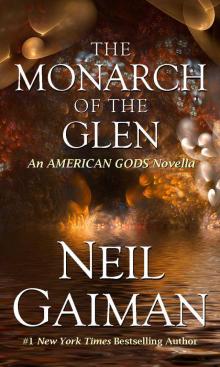 The Monarch of the Glen
The Monarch of the Glen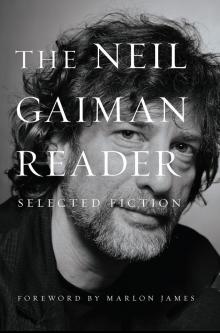 The Neil Gaiman Reader
The Neil Gaiman Reader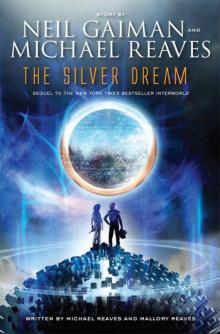 The Silver Dream
The Silver Dream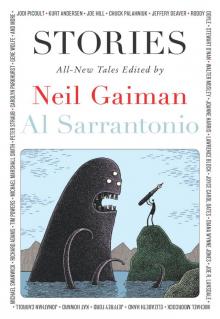 Stories
Stories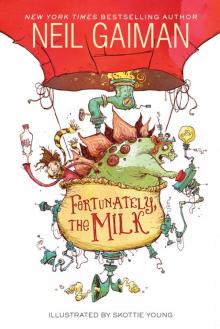 Fortunately, the Milk
Fortunately, the Milk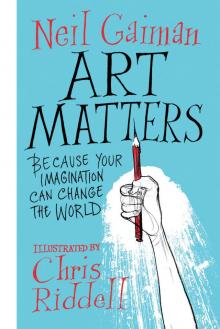 Art Matters
Art Matters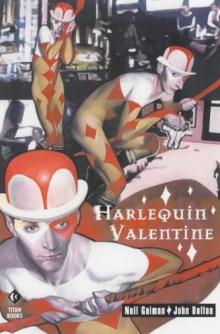 Harlequin Valentine
Harlequin Valentine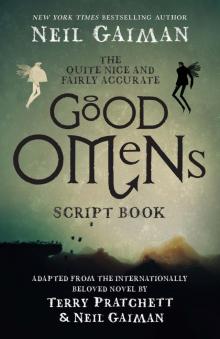 The Quite Nice and Fairly Accurate Good Omens Script Book
The Quite Nice and Fairly Accurate Good Omens Script Book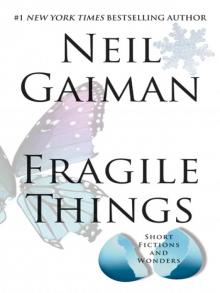 Fragile Things
Fragile Things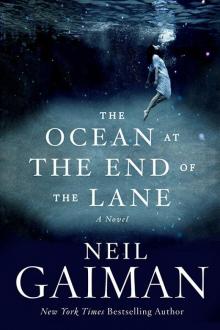 The Ocean at the End of the Lane: A Novel
The Ocean at the End of the Lane: A Novel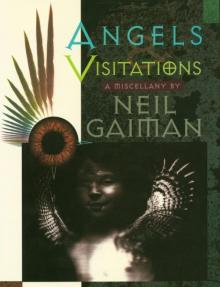 Angels and Visitations
Angels and Visitations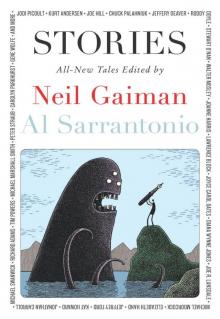 Stories: All-New Tales ngss-1
Stories: All-New Tales ngss-1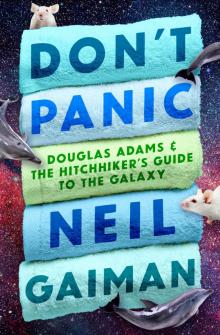 Don't Panic
Don't Panic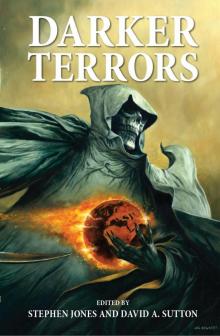 Darker Terrors
Darker Terrors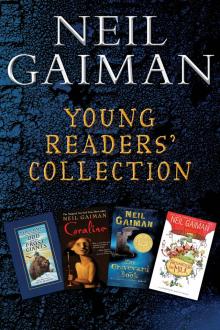 Neil Gaiman Young Readers' Collection
Neil Gaiman Young Readers' Collection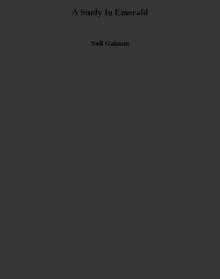 A Study In Emerald
A Study In Emerald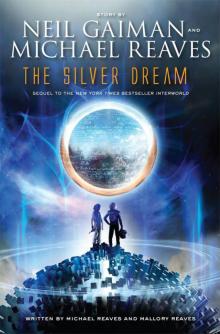 The Silver Dream: An InterWorld Novel
The Silver Dream: An InterWorld Novel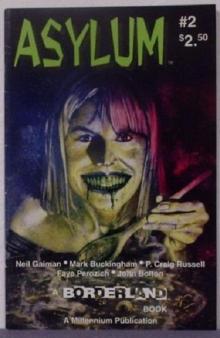 Feeders and Eaters
Feeders and Eaters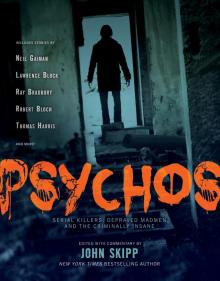 Psychos
Psychos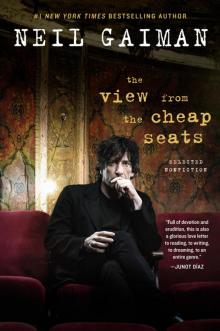 The View from the Cheap Seats
The View from the Cheap Seats Trigger Warning
Trigger Warning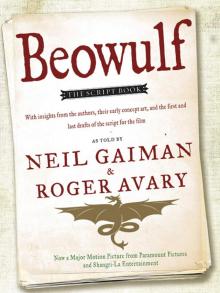 Beowulf
Beowulf Nessun Dove
Nessun Dove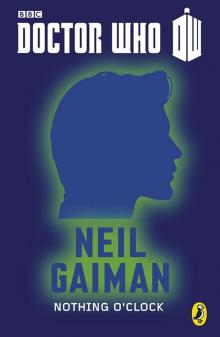 Doctor Who: Nothing O'Clock: Eleventh Doctor: 50th Anniversary
Doctor Who: Nothing O'Clock: Eleventh Doctor: 50th Anniversary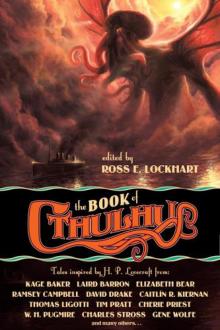 The Book of Cthulhu
The Book of Cthulhu